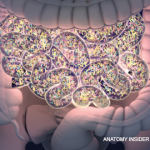Research in type I interferon (IFN) driven mouse models of systemic lupus erythematosus (SLE) suggests the microbiome may play a role in the development of autoimmunity. Additionally, changes in diet may induce protective effects in the gut.1
“Microbes in the gut worsen a lupus model related to the interferon pathway,” says Martin A. Kriegel, MD, PhD, author of a study on the topic in Cell Host & Microbe and adjunct professor of immunobiology at Yale School of Medicine, New Haven, Conn. “We found that the microbiome appears to be a part of this pathway because when you deplete microbes, SLE is ameliorated. We were able to narrow it down to a specific microbe, Lactobacillus reuteri.”
Role of Gut Microbiota
The researchers used both toll-like receptor-7 (TLR7) dependent spontaneous and inducible mouse models. The TLR7 transgenic line shows an 8–16 fold increase in TLR7 expression and spontaneous development of SLE. To induce SLE-like disease, wild-type mice were treated with a TLR7 agonist (topical imiquimod). The researchers then looked at the role of gut microbiota by suppressing growth with broad-spectrum antibiotics or a germ-free state.
Significant changes were seen in survival, decreases in splenomegaly and hepatomegaly, and type 1 IFN gene expression in the ileum, spleen and secretion in the blood. Other indicators, such as plasmacytoid dendritic cells, were suppressed in both models, by antibiotics or a germ-free state. These and other data indicate gut microbiota had an impact on TLR7-dependent autoimmunity.
The researchers defined the microbial community needed for autoimmunity. They collected fecal samples from both spontaneous and induced models. The lupus-prone mice carried different microbial communities than matched wild-type mice. Among these were L. reuteri, Desulfovibrio and Rikenellaceae. However, only Lactobacillus species translocated from the gut, and L. reuteri was dominant. Mice from both models had similar gut microbial community changes, gut leakiness, Lactobacillus species enrichment and translocation to internal organs.
To assess if the gut microbiota is transferable to non-autoimmune mice, the researchers cohoused young TLR7 transgenic mice with wild-type littermates. Fecal testing showed the majority of bacterial taxa enriched in the lupus-prone mice transferred. Included in the transfer were L. reuteri, Desulfovibrio and Rikenellaceae. Cohousing also led to increased gut leakiness and blood IgG levels while decreasing IgA in the stool. TLR7 expression was important because TLR7 knockout mice did not show increased leakiness following cohousing.
Lactobacillus Translocation

Dr. Kriegel
Lactobacillus species were the only microbes to translocate in cohoused wild-type mice. Unlike the lupus models, Lactobacillus johnsonii was the primary species translocated and was limited to mesenteric lymph nodes and the liver.
The researchers next wanted to see if gut microbiota exacerbated systemic autoimmunity. Cecal content was extracted from TLR7 transgenic mice and transferred to wild-type mice before imiquimod treatment. The wild-type mice developed severe splenomegaly, hepatomegaly, enhanced type 1 IFN expression and plasmacytoid dendritic cell accumulation. It increased leakiness and worsened renal disease. This proves that microbiota transferred, translocated outside the gut and exacerbated lupus.
“The microbes in our gut are really too many to deal with,” says Dr. Kriegel. “We, therefore, started with the few that moved beyond the gut barrier. Since we found Lactobacillus inside lymph nodes, [the] liver and spleen, we focused on this microbe.”
L. reuteri Exacerbates Symptoms
To establish if L. reuteri exacerbates lupus-related symptoms, L. reuteri or L. johnsonii tissue isolates were introduced into the stomachs of germ-free mice, which were then treated with imiquimod. Those treated and given L. reuteri developed spleen and liver symptoms and increased type 1 IFN expression compared with media alone or exposure to the other strain. L. reuteri exposure also increased gut permeability.
Because ingestion of these bacteria was sufficient to exacerbate SLE symptoms, the researchers investigated if L. reuteri alone drives systemic autoimmunity. They monocolonized young, germ-free mice with L. reuteri, treated them with imiquimod and examined them 10 weeks later. The mice developed splenomegaly and hepatomegaly and systemic type 1 IFN expression. These responses were not seen in monocolonization with an unrelated gut bacterium. The L. reuteri monocolonized group also accumulated more plasmacytoid dendritic cells than those in the unrelated bacterium group.
“The second part of our research looks at a resistant-starch diet and how that impacts on the microbiome and, in turn, on SLE-related mortality,” says Dr. Kriegel. Resistant starch is a carbohydrate that resists digestion in the small intestine and ferments in the large intestine. Colonic fermentation produces short-chain fatty acids, which are key mediators of gut microbiota. “The critical question was if we can change the gut microbes and, thus, the course of the disease.”
Impact of Diet

Dr. Perl
The researchers isolated fecal pellets of TLR7 transgenic mice fed a resistant-starch diet and performed bacterial DNA sequencing. L. reuteri was decreased in the mice fed a resistant-starch diet compared with controls fed a standard diet. Neither microbial diversity nor composition was significantly impacted by a resistant-starch diet. However, introduction of a resistant-starch diet decreased bacterial translocation, increased markers of gut integrity and prevented functional leakiness.
When continually feeding a resistant-starch diet to TLR7 transgenic mice and following them over half a year, the researchers found a significant survival advantage compared with the control group. When given to wild-type mice with induced lupus, a resistant-starch diet resulted in less organomegaly. Systemic type 1 IFN also normalized in both the inducible and the TRL7 transgenic model. A resistant-starch diet decreased expression of proinflammatory molecules in the spleen and gut, suggesting a systemic anti-inflammatory effect.
Short-Chain Fatty Acid Protective
The main metabolites from resistant-starch fermentation are the short-chain fatty acids acetate, propionate and butyrate. DNA sequencing from TLR7 transgenic mice fed a resistant-starch diet showed an increase in bacteria taxa capable of fermenting resistant starch, including Clostridiales that were lacking in control-fed mice. Sequencing of fecal microbiomes from SLE patients showed a reduced abundance of Clostridiales in a subgroup (enriched with lactobacilli) as seen in lupus-prone mice. The researchers found a similar imbalance between Clostridia and Lactobacillus in SLE patients, but have not yet intervened with their diets.
The researchers supplied short-chain fatty acids to the drinking water of TLR7 transgenic mice and those monocolonized with L. reuteri and treated with imiquimod. L. reuteri-induced effects were mitigated in both by short-chain fatty acid administration. Hepatosplenomegaly, plasmacytoid dendritic cell numbers in the spleen and lymph nodes, as well as proteinuria were suppressed to levels seen in wild-type mice.
“The resistant-starch diet is a protective mechanism,” says Dr. Kriegel. “In the models we studied, we can change the gut microbes and, thereby, change the course of the disease. We do not know yet if this diet would also work in patients, but we now better understand the baseline microbiome of SLE patients.”
Focus for Human Research
This was a well-done study, according to Andras Perl, MD, professor of medicine at the State University of New York Upstate Medical University. Syracuse. There are two important things to take away.
“Number one is that we are finding that environment can influence SLE in this mouse model,” he says. “In these mice there is a particular bacterium (L. reuteri) that drives autoimmunity. It stimulates the immune system through the expression of TLR7 by the bacterial DNA.”
The other key finding is that bacterial expansion is related to short-chain fatty acids. The availability of short-chain fatty acids inhibits the proliferation of L. reuteri, suggesting certain types of fatty acids might actually be good for you. “Whether or not this is true for humans, especially for patients with lupus, of course, is still an open question,” says Dr. Perl. “I think human research can now focus on how the bacterial flora can change the development of the disease.”
Kurt Ullman has been a freelance writer for more than 30 years.
Reference
- Zegarra-Ruiz DF, El Beidaq A, Iñiguez AJ, et al. A diet-sensitive commensal lactobacillus strain mediates TLR7-dependent systemic autoimmunity. Cell Host Microbe. 2019 Jan 9;25(1):113–127.e6. doi: 10.1016/j.chom.2018.11.009.


